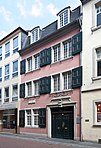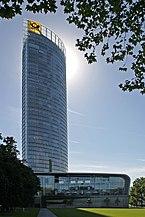Bonn | |
|---|---|
| Coordinates: 50°44′N 7°6′E / 50.733°N 7.100°E | |
| Country | Germany |
| State | North Rhine-Westphalia |
| Admin. region | Cologne |
| District | Urban district |
| Founded | 1st century BC |
| Government | |
| • Lord mayor (2020–25) | Katja Dörner[1] (Greens) |
| • Governing parties | Greens / SPD / Left / Volt |
| Area | |
• Total | 141.06 km2 (54.46 sq mi) |
| Elevation | 60 m (200 ft) |
| Population (2023-12-31)[2] | |
• Total | 335,789 |
| • Density | 2,400/km2 (6,200/sq mi) |
| Time zone | UTC+01:00 (CET) |
| • Summer (DST) | UTC+02:00 (CEST) |
| Postal codes | 53111–53229 |
| Dialling codes | 0228 |
| Vehicle registration | BN |
| Website | bonn |
Bonn (German pronunciation: [bɔn] ) is a federal city in the German state of North Rhine-Westphalia, located on the banks of the Rhine. It has a population of over 300,000. About 24 km (15 mi) south-southeast of Cologne, Bonn is in the southernmost part of the Rhine-Ruhr region, Germany's largest metropolitan area and the second biggest metropolitan region by GDP in the European Union, with over 11 million inhabitants. The city served as the capital of West Germany from its formation in 1949 until 1990 and as the capital of reunited Germany from 1990 until 1999 when the seat of government was moved back to Berlin. Bonn is the birthplace of Germany's present day constitution, the Basic Law.
Founded in the 1st century BC as an Ubii and then Roman settlement in the province Germania Inferior, Bonn is one of Germany's oldest cities. It was the capital city of the Electorate of Cologne from 1597 to 1794, residence of the Archbishops and Prince-electors of Cologne. From 1949 to 1990, Bonn was the capital of West Germany. The era when Bonn served as the capital of West Germany is referred to by historians as the Bonn Republic.[3]
Due to a political compromise (Berlin-Bonn Act) following the reunification, the German federal government maintains a substantial presence in Bonn. Roughly a third of all ministerial jobs are located in Bonn as of 2019[update],[4] and the city is considered a second, unofficial, capital of the country.[5] Bonn is the secondary seat of the President, the Chancellor, and the Bundesrat, and the primary seat of six federal government ministries and twenty federal authorities. The title of Federal City (German: Bundesstadt) reflects its important political status within Germany.[6]
The global headquarters of Deutsche Post DHL and Deutsche Telekom, both DAX-listed corporations, are in Bonn. The city is home to the University of Bonn and a total of 20 United Nations institutions, the highest number in all of Germany.[7] These institutions include the headquarters for Secretariat of the UN Framework Convention Climate Change (UNFCCC), the Secretariat of the UN Convention to Combat Desertification (UNCCD), and the UN Volunteers programme.[8] Birthplace of composer Ludwig van Beethoven, a center of Rhenish carnival, and its geography by the Middle Rhine make it an important tourist destination.
- ^ Wahlergebnisse in NRW Kommunalwahlen 2020, Land Nordrhein-Westfalen, accessed 19 June 2021.
- ^ "Bevölkerung der Gemeinden Nordrhein-Westfalens am 31. Dezember 2023 – Fortschreibung des Bevölkerungsstandes auf Basis des Zensus vom 9. Mai 2011" (in German). Landesbetrieb Information und Technik NRW. Retrieved 20 June 2024.
- ^ Anthony James Nicholls (1997). The Bonn Republic: West German Democracy, 1945–1990. Longman. ISBN 9780582492318 – via Google Books.
- ^ tagesschau.de. "Bonn-Berlin-Gesetz: Dieselbe Prozedur wie jedes Jahr". tagesschau.de (in German). Retrieved 26 April 2019.
- ^ Cowell, Alan (23 June 2011). "In Germany's Capitals, Cold War Memories and Imperial Ghosts". The New York Times. Archived from the original on 1 January 2022.
- ^ Bundestag, Deutscher. "Deutscher Bundestag: Berlin-Debatte / Antrag Vollendung der Einheit Deutschlands, Drucksache 12/815". webarchiv.bundestag.de (in German). Retrieved 19 February 2017.
- ^ Amt, Auswärtiges. "Übersicht: Die Vereinten Nationen (VN) in Deutschland". Auswärtiges Amt (in German). Retrieved 6 February 2020.
- ^ "UNBonn.org".










